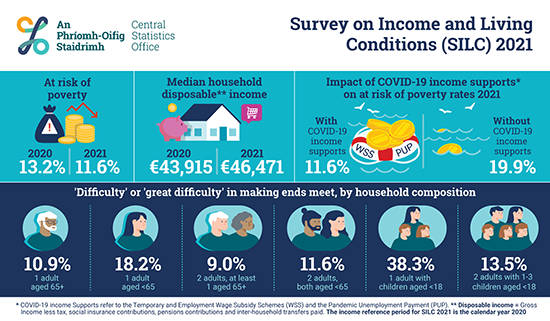
SVP warns of worrying data behind headline poverty figures
In response to the publication of the 2021 Survey of Income and Living Conditions (today 06/05/2022), the Society of St Vincent de Paul (SVP) has welcomed the decline in headline poverty rates in 2021. This decline is largely driven by the positive impact of the Covid-19 supports but the Society says behind the headline figures are some very worrying data for those already in poverty.
The data from the Central Statistics Office shows an increase on some indicators of deprivation in relation to food and energy for those already living in poverty. For example, the proportion of those in consistent poverty who couldn’t afford adequate nutrition (i.e. a meal with meat, fish every second day) rose from 11.6% to 17.9% and the numbers unable to adequately heat their home rose from 21.2% to 24.2%.
Looking at groups at the highest risk of poverty prior to the pandemic shows hardship is persisting or intensifying. SVP is particularly concerned about the increase in consistent poverty for people unable to work due to illness or disability (from 16.2% to 19.2%). The fall in income poverty for one parent families is welcome but levels of deprivation remain unchanged and unacceptably high at 44%. Worryingly, three quarters (74.8%) of one parent families had some difficulty in making ends meet, compared to 39.7% of other families with children.
SVP highlighted that some of the most marginalised groups in Irish Society including those living in Direct Provision, emergency accommodation and members of the Travelling community are not counted in official poverty statistics.
SVP Head of Social Justice, Dr. Tricia Keilthy said; “The results published today by the CSO shows the power of a strong safety net in protecting people from poverty. The strong and quick response from Government in the initial phases of the pandemic prevented many households for entering poverty. However, for those already struggling and on inadequate income supports, we see a persistence of hardship for some groups and a worsening situation on a number of indicators. The results mirror the experience of SVP during the pandemic where those in poverty and not eligible for Covid-19 supports struggled with an increase in food and energy poverty during lockdowns and school closures.”
The data also shows the clear impact of high housing costs on renters, and particularly low-income renters in receipt of housing supports. After paying rent, 59.1% of those in receipt of Housing Assistance Payment or Rent Supplement were at risk of poverty, compared to 10.9% before rent is paid. This confirms the experience of SVP members who have seen housing costs as a key driver of poverty and financial hardship in recent years.
In 2021 and before the energy crisis deteriorated, 38.6% of households in consistent poverty have been in arrears on utility bills. One in four one parent households were in arrears on utility bills.
“Since the data was collected, we have seen the removal of Covid-19 income supports and a period of rapid inflation. So far this year, SVP has taken over 62,000 calls for help, an increase of 15% compared to 2021. With the impact of rising costs being much harsher for households on low incomes, there is a clear case for targeted protections to prevent serious hardship. The CSO data clearly shows the need for adequate income supports for all and it is critical that Government commit to benchmarking social welfare payments and minimum wages to an adequate level. Investment in quality public services is also needed if the Government is to be successful in reaching their own targets as set out in the Roadmap for Social Inclusion”, said Dr. Keilthy.

